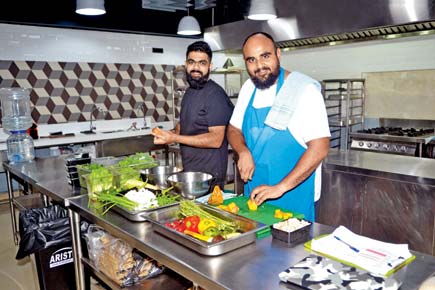Not happening. City restaurateurs talk of how tough it is to achieve zero waste status and what they are doing while they look for better solutions

When restaurateurs lunch together the conversation always, ultimately, comes down to food and the discussion of food wastage is never far off. At a shoot for mid-day recently, chefs Kelvin Cheung (Bastian), Karishma Dalal (Bombay Salad Co) and Pooja Dhingra (Le 15 Cafe) lamented the lack of composting facilities in the city. They say they have been trying hard to find an eco-friendly solution for their waste, much of which ends up being handed to the local civic body and ends up in a landfill. They have considered joining forces and starting their own composting facility, but it's early days.
Cheung, Dalal and Dhingra might find kindred spirits in other city restaurateurs who face a similar challenge. While some compost a small percentage of the garbage they generate daily, others try and reuse, some control output by cooking on a need-per-order basis, but the greater amount gets binned.
Bombay Salad Co, Bandra West
Waste generated every week: 700 kg
Waste disposed organically every week: Approx 50 kg Karishma Dalal (in pic), who runs Bandra's hip Bombay Salad Co, is waiting for someone to come up with a novel idea that could use all the organic waste her restaurant generates. "As we are a salad bar, most of our waste is made up of peels, stalks and leaves. Around 15 per cent is just cabbage!" As a restaurateur, it would be a huge economical undertaking for Dalal to send her garbage to a large composting facility, which Mumbai doesn't seem to have . "I have kept an eye out and nobody collects it on a large scale. The ones who do, in the suburbs, want me to arrange transportation."
What sheâu00c2u0080u00c2u0088is doing right: Distributing garbage to locals who compost at home
Solution: Dalal is trying to do her bit. Every week, she gives around five kg to Bandra residents who compost at home, and around 20 kg every three days to a friend from Pune who uses it in his nursery. "And, BMC comes twice a day for the rest."
Pod Supply, Andheri West (Meal prep service)
Waste generated every week: Approx 30 kg
Waste disposed organically every week: None
Chef Harsh Dixit says they follow waste management procedures including segregation as they only prep an order according to required quantities. He also says that they have never tried composting. "I have worked in three major cities - Mumbai, Bengaluru and New Delhi - before Pod Supply, but I have never experienced restaurants composting their waste. I do believe with the changing food scene in the country; chefs and restaurant owners being more aware about practices like these, it will soon be adopted too."
What they are doing right: Achieve minimal waste by using ingredients to the maximum
Solution: "For example, we use the vegetable peels/fish bones to make stock which we use to cook rice, make soups and base for curries. Off cuts of meats and seafood are used for the kitchen staff meals. But we do land up with a lot of egg yolks as we use more of whites."
Ministry of Salad, Breach Candy
Waste generated every week: Approx 4 to 5 kg
Waste disposed organically every week: Approx 4 to 5 kg
Head Chef Akanksha Saigal says the main challenge she faces is that one day's waste is never the same as the next. It depends on the quantity of order versus what is consumed. "Luckily for us, our estimates are usually close to the benchmark," she says. She does say that in ideal conditions, they would like to compost this waste themselves or via an agency, however, as per regulations, they would need a license to do it. "At our end, we try to keep the waste down and only hope that the BMC makes good use of it."
What they are doing right: Reducing waste generated by ordering only what's necessary The restaurant works on an aggressive inventory system with the core team defining approximate sales per day. "This experience has made us almost intuitive, and we know how much to order for a particular day. Ordering right is the key here." Saigal also insists on using ingredients across dishes to ensure less wastage.
Lord of the Drinks, Andheri West
Waste generated every week: Approx 700 kg
Waste composted every week: None
At the Andheri hotspot, a majority of its waste comes from leafy greens and other vegetables since not all parts of every vegetable can be consumed. "Therefore, waste from meat is lesser," says JJ, Corporate Chef. The restaurant has tried composting, but it's not cost effective. "We use the segregation method. Due to lack of space for storing waste in Mumbai, a part of it usually gets disposed in garbage vans. I think the answer could be to install composting machines. However, these may not be cost effective for every establishment," he says.
What they are doing right: Segregating dry and wet garbage and using the former for manure, inhouse
Solution: The food waste is usually segregated between dry and wet. "Composting of dry garbage is easy at the restaurant level as most of it gets reused while gardening and makes for good manure," says JJ. But most of the wet garbage is binned. "There is hardly any government support in composting of such garbage."
 Subscribe today by clicking the link and stay updated with the latest news!" Click here!
Subscribe today by clicking the link and stay updated with the latest news!" Click here!









